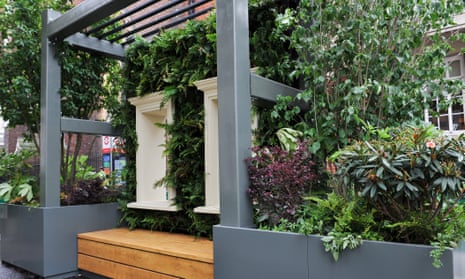An award-winning garden aiming to bring peace, tranquility and improve air quality for London shoppers, opens on Monday off Oxford Street as part of a major project to green the West End.
The Wild West End garden, which won a gold medal at the Chelsea flower show last month, has been transplanted into the busy retail heart of the capital.
Designed by award-winning designer Kate Gould, a five times Chelsea gold medallist, the green oasis features many garden plants chosen for their contribution to air purification.
It was installed at the weekend on Old Quebec Street at the Marble Arch end of Oxford Street, and is accessible free of charge to the public.
It was created as part of the Wild West End, a partnership between property owners to create more green space in the area, which has so far has involved the installation of 6,500 square metres of green space, including 49 green roofs, beehives, and boxes for birds and bats.
Surveys have shown bird species such as black redstarts and starlings, and bat species such as Leisler’s bats, all of which have a high conservation priority, are taking up residence in the West End.
The new communal garden was created by a partnership between New West End Company, Europe’s largest retail-led business partnership, The Portman Estate, Baker Street Quarter Partnership, Marble Arch Partnership BID and Wild West End.
The ferns and plants have been specifically chosen to help remove pollution, and include acers, Chinese dogwood trees and seven-son flower trees, all believed to have a beneficial impact on air purity.
Lightweight trees will provide shelter and seclusion from the bustling urban surroundings, with vibrant low-level plantings beckoning in visitors off the street.
It will be open throughout the day and into the evening, with light boxes to illuminate the space after dark.
London is often cited as having one of the poorest air quality records in Europe, and studies have shown more than 9,000 people die early each year as a result of air pollution in the city.
The garden aims to regenerate Old Quebec Street, and improve the visitor experience for the 142 million people that shop at Oxford Street’s 260 stores each year.
Gould, who won a gold medal in the Spaces to Grow garden category at Chelsea last month, said she felt privileged to have been asked to be a small part of the greening of London.
“Many of the gardens I have put on the show ground at Chelsea have been related to this theme as I feel it is imperative to create healthier spaces for people living in an frequenting the city,” she said.
“I hope the garden thrives, is well used, and helps to improve the air quality for visitors and residents of the West End for the time it will be spending in this space.”
Wild West End is a partnership between the crown estate, Grosvenor Britain & Ireland, The Portman Estate, Great Portland Estates, The Howard de Walden Estates and Shaftesbury, along with the Mayor of London, the London Wildlife Trust and consultancy firm Arup.
Jace Tyrrell, the chief executive of New West End Company, said: “The Wild West End garden will provide a tranquil place for people to visit, amidst the vibrancy of London’s West End. But, even more importantly, it demonstrates London’s credentials as a forward thinking city, looking to constantly advance and improve on key issues that face major cities, like air quality and protecting and enhancing opportunities for wildlife and plants.”
Simon Loomes, the strategic projects director of The Portman Estate, said: “For us it is a first step which, if successful, will see the creation of a number of more permanent pocket parks across the district. Our estate sits between Regent’s Park and Hyde Park and these new sites will help create ecological corridors allowing wildlife to migrate and benefit from a wider green network.”
The benefits of green spaces in cities have been well documented. According to one study New York’s MillionTreesNYC project, which saw 1m trees planted, reportedly removes 2,200 tonnes of pollution from the atmosphere each year.
